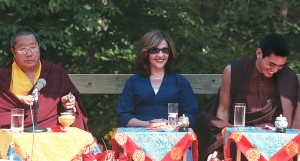The following is an excerpt from a teaching by Jetsunma Ahkon Lhamo called “AA & Buddhism”
Now with alcohol or drugs, the nature of the beast is that you’re going to hit bottom. At some point, things are really going to fall apart. One of the additional problems with samsara is that we can be angry every day, we can be needy every day, we can be miserable beyond belief every day, but we may not bottom out until we die. And right before we die we look back at our lives and go, ‘Gee, you know I’ve been miserable and angry and needy just about every day here. And now I’m dying.’ What are you going to do about it then? You know, think about it. You’re going toes up into the bardo. And you’re going to be faced with the nature, with your mind, with your habitual tendencies.
So, the problem with samsara is even more acute. I think samsara is even more a drug than heroin. Even more a damaging substance, or damaging condition, than addiction to alcohol. And the reason why I think that is because in samsara, the way it plays out, even though things have fallen apart, even though we have bottomed out, even though we are utterly miserable, we often can’t see it because we’ve been taught that that’s simply the way it is. That’s simply the way it is.
So like an addict that changes bars in order to solve his unhappiness… And it happens, doesn’t it? You go from one kind of social scene to another kind of social scene thinking that it’ll help. Like that, we go from day to day trying to solve the problem of samsara by bending the elbow a little more. And that’s kind of how it goes. Now the situation that we find ourselves in is very similar to that. And in terms of being addicted to samsara, we have to really dismantle the delusion of samsara. We have to see the faults of it. Now, according to the Buddha’s teaching, there are certain pre-written faults of samsara that you can rely on; but I really recommend that you look very carefully at your own condition in a courageous way.
I don’t think that that can happen very easily on your own, because you’re going to miss some things, a lot of things. It is remarkable to me… For instance, let’s use a hypothetical situation that I ran into just recently. Let’s say you have a friend (and probably you’ve seen this), who has a habitual tendency of terribly destructive relationships. Do you know anybody like that? How about yourself? Terribly destructive relationships in which it never happens that your friend walks out of a relationship unscathed. They always come out of it damaged in some way. Terribly destructive relationships. It seems to be a big item here in samsara. It’s like a big seller. It’s right up there with T-shirts. Big seller. So we’re in terribly, terribly addictive relationships. And then you see this person go into another terribly destructive relationship. The woman looks different. She smells different. She sounds different. How is it possible that she’s exactly the same as all the other ones he’s had? And you want to say to your friend, whap, whap, wham! ‘Don’t you see that you’re doing it again?’ And they don’t! They have not a clue, nary a clue. Now has that ever happened to you? Not a clue! Have you ever seen your friend do that? Have you ever seen yourself do that? It’s the same song again and again and again. So you may need to get with someone who’s a little bit more advanced at this than you are, or at least someone you can talk to, someone you can trust.
I actually recommend that for my students. I set up a system where they can do partnering with each other. And it’s a useful thing, because we can look at each other’s patterns; and we can look at where each other’s thinking has just sort of slid over a few very important facts. And we can point it out and really help each other to stay honest, because we don’t have the habit of honesty. We have the habit of patching things up and putting band-aids on them. That is our habit. We’re trying to slick by, Jack! And that’s what we’re doing. So what we need to do is to try to find a way to cut to the bone, and you may need a friend to do that with.
Now if any of you wish to engage, those of you who are my students, and those of you who are thinking of becoming students, to engage in such a practice of really dismantling your habitual tendencies, to really look at the faults of cyclic existence and to really get with that, I heartily suggest that you do so. And certainly any of you are welcome to call on any of my students, those who have been with me for some time and have some of those skills; and I’m sure they would be willing to help you. We’re set up to do that. We’re like that. And there’s nothing to be shy about. The one thing I have to tell you about this is that whatever you’ve done, I know these people, they’re worse. There’s not a rose amongst them. Although they’re looking pretty sweet these days. There’s not a rose amongst them, believe me. There’s not one amongst them that probably hasn’t done worse. So there’s nothing to be afraid of. The deal is, and here’s something that’s really important, in both Alcoholics Anonymous and in the Buddhadharma, confession and remorse are essential components.
Copyright © Jetsunma Ahkon Norbu Lhamo All rights reserved








